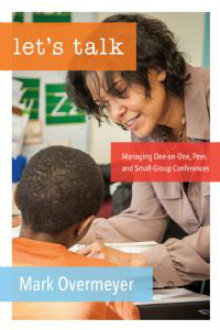How to Conference Well with Student Writers
Let’s Talk: One-on-One, Peer, and Small-Group Writing Conferences
By Mark Overmeyer
(Stenhouse, 2015 – Learn more)

If you’ve read any of the “classic” books about workshop teaching (I’m thinking of Nancie Atwell’s In the Middle or Donalyn Miller’s The Book Whisperer), then you know their mantra is conference, conference, conference. And talk, talk, talk.
I’d read about writing conferences in plenty of professional books and articles, and I knew it was something I should be doing. I had also tried it out in my classroom, but I found myself struggling to know what questions to ask students, what to talk about, and how to follow up with students in later conferences.
Then I found Mark Overmeyer’s Let’s Talk: One-on-One, Peer, and Small-Group Writing Conferences (Gr. 3-8), and I soon realized it was exactly the book I needed.
We all need models

In Let’s Talk the reader can peek over Overmeyer’s shoulder as he holds conferences with students, explains his writing conference technique, and guides peer conferences between students. Throughout the book, he weaves in personal anecdotes and example conversations with students to illustrate the concepts he is explaining.
This isn’t to say the book is overwhelmed by anecdotes and examples. It’s a concise, quick read (a little less than 120 pages) – the perfect length for Overmeyer’s topic.
More about the content
The book is outlined logically and clearly. The introduction and first chapter discuss the rationale for using conferences in writing instruction and how to give students feedback on their writing. Then, in the longest chapter, Overmeyer explains the basics of the “classic” conference between the teacher and a single student. He describes the “architecture” of a conference (starting with noticing the positive, followed by asking clarifying questions) and he offers plenty of question starters for possible conferencing at the beginning, middle, and end of the writing process.
Together, these first few chapters make up about the first half of the book, and, to be honest, this was the part of the book I found most helpful and relevant to my current needs as a teacher. However, the final chapters were also useful, and they include several conference structures that I will definitely work into my teaching as I master the “classic” conference.
There are two chapters about conferences with multiple students at a time (one about small group conferences and one about whole group conferences) and two chapters about facilitating students as they hold peer writing conferences with one another (one about student pairs and one about small groups of students).
I’ll be conferencing more this year
As I already stated, there were sections of Let’s Talk that I found most helpful, but the entire book was worth the time invested, especially because it was short and easy to read. Without a doubt, I can say that I finished the book with a better grasp of how to lead a writing conference and how to talk my students through their writing.
I’m inspired and motivated to hold more conferences, both formal and informal, with my students throughout this school year, and I know it will improve their writing experiences in my classroom.
Tyler McBride is a 7th grade English Language Arts and Social Studies teacher at Lincoln Middle School in Lincoln, Arkansas. He is a teacher-consultant with the Northwest Arkansas Writing Project and a board member of the Arkansas Council of Teachers of English and Language Arts. His blog, Common Sense in ELA, documents his thoughts about teaching language arts. He currently lives in Lincoln, Arkansas, with his wife Vasti and their dog and two cats.


































